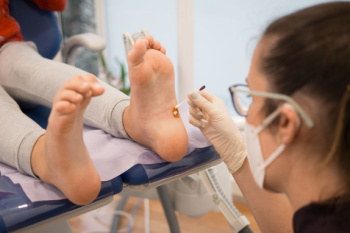Understanding Plantar Warts
Tuesday, 12 November 2024 00:00
Plantar warts are small, rough growths that occur on the soles of the feet, caused by the human papillomavirus. These warts can be uncomfortable and often appear as hardened, raised areas with small black dots, which are actually tiny blood vessels. Symptoms typically include pain or tenderness when walking or standing, making daily activities challenging. Diagnosis usually involves a physical examination by a podiatrist, who may confirm the presence of a wart based on its appearance and location. In some cases, a biopsy may be performed to rule out other conditions. Preventing plantar warts involves maintaining foot hygiene, wearing appropriate footwear in communal areas, and avoiding direct contact with warts on other individuals. If you have developed this potentially painful condition, it is suggested that you consult a podiatrist who can offer you appropriate treatment solutions.
Plantar warts can be very uncomfortable. If you need your feet checked, contact Milos Tomich, DPM from Dr. Tomich Foot & Ankle Health Center. Our doctor will assist you with all of your foot and ankle needs.
About Plantar Warts
Plantar warts are the result of HPV, or human papillomavirus, getting into open wounds on the feet. They are mostly found on the heels or balls of the feet.
While plantar warts are generally harmless, those experiencing excessive pain or those suffering from diabetes or a compromised immune system require immediate medical care. Plantar warts are easily diagnosed, usually through scraping off a bit of rough skin or by getting a biopsy.
Symptoms
- Lesions on the bottom of your feet, usually rough and grainy
- Hard or thick callused spots
- Wart seeds, which are small clotted blood vessels that look like little black spots
- Pain, discomfort, or tenderness of your feet when walking or standing
Treatment
- Freezing
- Electric tool removal
- Laser Treatment
- Topical Creams (prescription only)
- Over-the-counter medications
To help prevent developing plantar warts, avoid walking barefoot over abrasive surfaces that can cause cuts or wounds for HPV to get into. Avoiding direct contact with other warts, as well as not picking or rubbing existing warts, can help prevent the further spread of plantar warts. However, if you think you have developed plantar warts, speak to your podiatrist. He or she can diagnose the warts on your feet and recommend the appropriate treatment options.
If you have any questions please feel free to contact one of our offices located in Milwaukee and Wauwatosa, WI . We offer the newest diagnostic and treatment technologies for all your foot and ankle needs.




